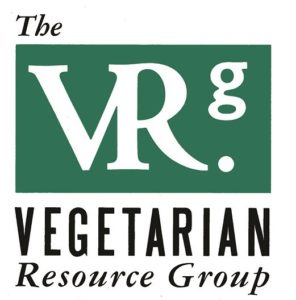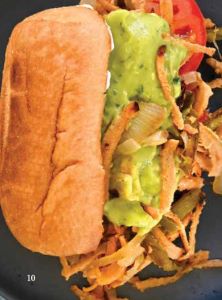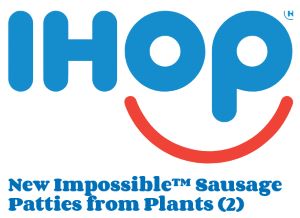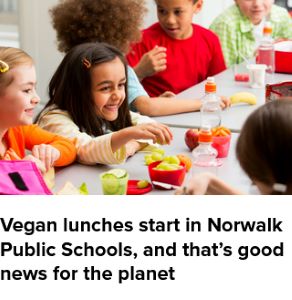Posted on
December 07, 2023 by
The VRG Blog Editor

Caribbean Food Delights makes delicious vegan frozen seasoned patties that can be prepared in an air fryer, microwave, or on your stove-top in very little time. Some of the varieties include Jamaican Curry Jackfruit, Jamaican Style Jerk BBQ Jackfruit, Vegetable Patties, Spinach Patties, and Plantain Tarts. See our review in Vegan Journal: https://www.vrg.org/journal/vj2023issue4/2023_issue4_veggie_bits.php
To subscribe to Vegan Journal visit: https://www.vrg.org/member/2013sv.php
Category
Uncategorized
Comments
0
Posted on
December 06, 2023 by
The VRG Blog Editor

Photo by Rissa Miller
Vegan Journal Senior Editor Rissa Miller wrote an article titled, On a Roll. She provides vegan recipes for making the dough (including a gluten-free option) or if you’re in a rush how to use vegan canned crescent-style dough. You’ll also find three sweet roll fillings and three savory roll fillings. Start baking today!
Read the complete article here: https://www.vrg.org/journal/vj2020issue1/2020_issue1_on_roll.php
Subscribe to Vegan Journal in the USA only by visiting https://www.vrg.org/member/2013sv.php
Category
Uncategorized
Comments
0
Posted on
December 06, 2023 by
The VRG Blog Editor

Chanukah is a time that extended families gather together. Here are some vegan recipes from The Lowfat Jewish Vegetarian Cookbook (a vegan cookbook) you can share with your friends and family during the 8-day celebration.
Potato Latkes
Serves 4
1-½ pounds potatoes, peeled and grated
1 medium onion, peeled and grated
3 Tablespoons cornstarch
1 Tablespoon fresh parsley, finely chopped
Dash of pepper
2 Tablespoons tamari or soy sauce
Mix all the ingredients together in a large bowl. Form 3-inch patties and fry in lightly oiled pan over medium heat for 10 minutes. Flip latkes and fry for another 10 minutes until crisp on both sides. Serve warm with applesauce or other cooked fruit.
Broccoli Latkes
Serves 5
1 pound broccoli, chopped into small pieces
2 pounds potatoes, scrubbed and cubed into small pieces
1 onion, peeled and finely chopped
3 cups water
½ teaspoon celery seed
Salt and pepper to taste
1 Tablespoon oil
Cook all the ingredients (except the oil) in a large covered pot over medium heat for 20 minutes. Drain mixture and mash ingredients together.
Heat oil in a large non-stick frying pan over medium heat. Form 10 pancakes. Fry 8 minutes on one side. Flip pancakes and fry for another 5 minutes on the other side. Serve warm.
You can purchase the vegan recipe book The Lowfat Vegetarian Cookbook here: https://www.vrg.org/bookstore/index.php?main_page=product_info&cPath=1&products_id=13
Category
Uncategorized
Comments
0
Posted on
December 06, 2023 by
The VRG Blog Editor

In the latest issue of Vegan Journal, Reed Mangels, PhD, RD, reviews recent scientific papers related to vegetarianism. Topics covered include Dietary Factors Associated with Type 2 Diabetes, New Guide for Vegetarian Athletes, and Phytoestrogens Are Associated with Lower Mortality. See: https://www.vrg.org/journal/vj2023issue4/2023_issue4_scientific_update.php
To subscribe to Vegan Journal visit: https://www.vrg.org/member/2013sv.php
Category
Uncategorized
Comments
0
Posted on
December 05, 2023 by
The VRG Blog Editor

Be sure to follow The Vegetarian Resource Group on Instagram: @vegetarianresourcegroup
Category
Uncategorized
Comments
0
Posted on
December 05, 2023 by
The VRG Blog Editor

Al Pastor Cheeseless-Steak Sandwich photo by Rissa Miller
Chef Roberto Carlos Perez shares a number of Mexican Fusion dishes in his Vegan Journal article. Enjoy Mexican-American Breakfast, No-Lomo Salteado Vegan Burritos, Mexican-Inspired Spaghetti, Fettuccine Roberto, and Al Pastor Cheeseless-Steak Sandwiches. See: https://www.vrg.org/journal/vj2023issue4/2023_issue4_mexican_fusion.php
To subscribe to Vegan Journal visit: https://www.vrg.org/member/2013sv.php
Category
Uncategorized
Comments
0
Posted on
December 04, 2023 by
The VRG Blog Editor

In our latest Nutrition Hotline column, a Vegan Journal reader asks, “My husband and I are healthy long-term vegans. Neither of us eat much processed food nor cook with a lot of oil… Is a completely oil-free diet worth the effort? VRG’s Nutrition Advisor, Reed Mangels, PhD, RD, answers their question here: https://www.vrg.org/journal/vj2023issue4/2023_issue4_nutrition_hotline.php
To subscribe to Vegan Journal visit: https://www.vrg.org/member/2013sv.php
Category
Uncategorized
Comments
0
Posted on
December 01, 2023 by
The VRG Blog Editor

Thank you to more generous donors, in 2024 The Vegetarian Resource Group will be awarding $30,000 in college scholarships! Deadline is FEBRUARY 20, 2024.
We will accept applications postmarked on or before FEBRUARY 20, 2024. Early submission is encouraged.
Applicants will be judged on having shown compassion, courage, and a strong commitment to promoting a peaceful world through a vegetarian (vegan) diet/lifestyle. Payment will be made to the student’s college (U.S. based only). Winners of the scholarships give permission to release their names to the media. Applications and essays become property of The Vegetarian Resource Group. We may ask finalists for more information. Scholarship winners are contacted by e-mail or telephone. Please look at your e-mail.
If you would like to donate to additional scholarships or internships, go to www.vrg.org/donate
Applications
Please click here to download a PDF of the application. However, applicants are not required to use an application form. A neatly typed document containing the information below will also be accepted as a valid application.
Please send application and attachments to [email protected] (Scholarship application and your name in subject line) or mail to The Vegetarian Resource Group, P.O. Box 1463, Baltimore, MD 21203.
If emailing, please put your essay in a separate attachment with your first name and last initial. A PDF or Word document is preferred, but if you send a Google document, make sure permission is given so readers can access it. For more information call (410) 366-8343 or email [email protected].
Category
Uncategorized
Comments
0
Posted on
December 01, 2023 by
The VRG Blog Editor

See IHOP’s vegetarian and vegan menu guide https://www.ihop.com/-/media/ihop/nutrition/ihop-vegan-and-vegetarian-guide-core-2-2023–92723.pdf
With the caveat that they use shared cooking and prep areas, including common fryer oil, and are unable to guarantee that any menu item be completely free of animal products, they list as vegan:
- Crispy Breakfast Potatoes
- Fresh Fruit
- Hash Browns
- Multi-grain toast (no butter or jam)
- French Fries
- Plant-Based Sausage Patties
- Steamed Fresh Broccoli (no garlic butter
The contents of this posting, our website and our other publications, including Vegan Journal, are not intended to provide personal medical advice. Medical advice should be obtained from a qualified health professional. We often depend on product and ingredient information from company statements. It is impossible to be 100% sure about a statement, info can change, people have different views, and mistakes can be made. Please use your best judgment about whether a product is suitable for you. To be sure, do further research or confirmation on your own.
Category
Uncategorized
Comments
0
Posted on
November 30, 2023 by
The VRG Blog Editor

photo from Friends of Animals
The Norwalk, CT school district will start having a vegan option on the menu each day. Offerings will include hummus, plant-based chicken nuggets, sweet and crunchy chickpea wraps, plant-based “beef crumbles” and burgers, and a Mediterranean salad.
For more information, see https://ctexaminer.com/2023/10/27/vegan-lunch-options-expand-in-ct-schools-nonprofit-advocates-for-change/
Category
Uncategorized
Comments
0










